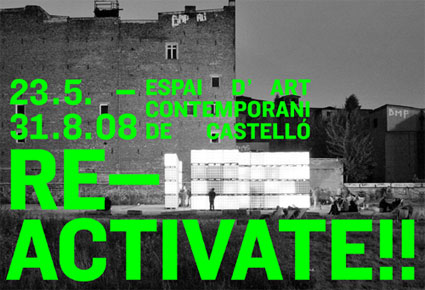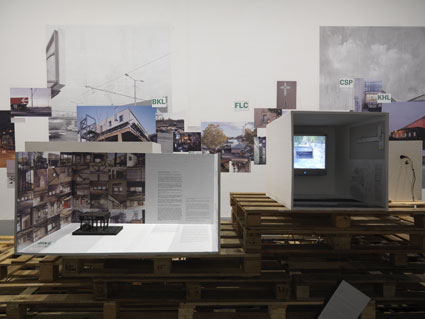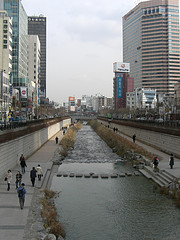
As announced two days ago, here's a lengthier report about REACTIVATE!! Espacios remodelados e intervenciones mínimas (Remodeled spaces and minimal interventions), an exhibition which takes place until August 31 at the Espai d' Art Contemporani de Castelló, an hour away from Valencia.

View of the exhibition. Image courtesy of the Espai d' Art Contemporani
If we start now, we can choose what we want our cities to look like in the future. We can make them the resilient, sustainable centers of culture, justice, art and creativity that we hope they will become.
Author and Professor Peter Newman is asking us to imagine and then get to work building these urban centers. His book and talk, both titled Resilient Cities: Responding to Peak Oil and Climate Change , ask audiences to honestly look at what will happen to our cities when we reach Peak Oil. During his 90 minute presentation last night at Seattle's City Hall, Newman explained to the full house how peak oil will soon change reality as we know it; and how if we choose to make it so, we can take this challenge as our opportunity to create a functional, just and sustainable world.
, ask audiences to honestly look at what will happen to our cities when we reach Peak Oil. During his 90 minute presentation last night at Seattle's City Hall, Newman explained to the full house how peak oil will soon change reality as we know it; and how if we choose to make it so, we can take this challenge as our opportunity to create a functional, just and sustainable world.
Picturing a future where we do nothing resulted in some frightening scenarios: ones where we are barely getting by and injustice is running rampant. But, as Newman explained, picturing a future in which we respond to the challenge by building resilient cities results in images of a flexible and supportive, flourishing society.
So, in 2001, under the direction of Seoul's Mayor Lee Myung-bak, a plan was developed to tear down the freeway and to restore the river. The project was completed in 2005
 |
In order to build the new resilient city of the future, Newman said that “we need to stop building extra urban road capacity and urban scatter; we need to start building electric renewable cities with much greater localism in the economy and infrastructure.”
“We need both at the same time," Newman said. "Or they will undermine what we need to do together.”
Here are a few exceptional points, summarized from Newman's worldchanging presentation:
End Agglomeration Diseconomies
The freeway is a failed technology. Freeways don’t actually ultimately help people get where they want to go any faster; they simply scatter people and economies. Freeways fail as public spaces; as infrastructure, they are dinosaurs. Their impact on cities is not good for economics or people. So we should stop building them. We should instead organize and advocate for rail systems so we can reclaim and rehabilitate our open spaces. Car-dependent cities can begin to reclaim freeways by investing in rail transit and building up local economies around station hubs.
Density, Walkability and Affordable Housing
High quality, high rise developments in the city will increase walkability, and decrease the number of trips taken by car. These developments will function best if developers work in partnership with land use planners. To end the division and disagreements that high density development creates, we have to require all developments to allot 15 percent of space to social housing, and require 5 percent of the value of a development to go toward social infrastructure, like landscaped open-to-the-public space, public art, community centers, schools, arts facilities.
Complete Streets, Smart Grids
Cars won’t go away completely, even though the oil we currently use to power them will. The cars of the future will run on alternatively produced electricity. We can link the extra energy produced from solar and wind production systems to the batteries in our cars with Smart Grids. These energy linking systems help buildings and transportation power each other. (Read more about Smart Grids on Worldchanging here and here.)
Eco-villages colonizing the fringe
Build eco-villages on the outskirts of the urban ring. Built with their own water, power and sewage systems, we can turn the crumbling suburbs into self sustaining eco-communities of the future.
What We Need to do Now
Newman gave vibrant examples of each of these ideas happening in cities all over the world, from Seoul to London, Copenhagen to Vancouver, B.C., these cities are proving that this is possible. All we need now, said Newman, is imagination, post oil strategies, partnerships and demonstrations, and above all HOPE!
Let’s get to work.
-----
Via Worldchanging
Personal comment:
Re-activate, une exposition (dont on a déjà parlé dans ce blog) mise sur pied par le Schweizerisches ArchitekturMuseum de Bâle est ici ré-activée (...) à valence. Ce qui nous intéresse ici est plutôt le compte rendu de la conférence du Prof. Peter Newman qui parle de la ville du "peak oil" et du "climate change": Resilient cities



